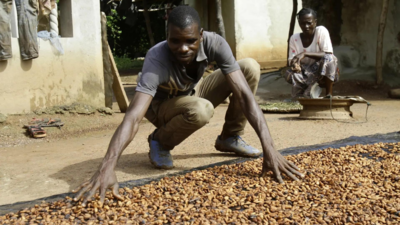Struggling Ivory Coast cocoa farmers worried about US tariff plans

N’GATTAKRO: Jean Mari Konan Yao says he’s struggling as a cocoa farmer in the west African nation of Ivory Coast, which produces almost half the world’s cocoa supply of the raw ingredient used in chocolate. Like many in Ivory Coast – the world’s biggest cocoa producer – Konan Yao says cocoa has long provided a lifeline for him, but adverse weather and plant diseases have hurt harvests in recent years.
Now, cocoa farmers worry even more over President Donald Trump’s plans to impose a 21 per cent tariff on products from Ivory Coast – the highest among West African nations.
Although Trump has suspended the tariff plans for 90 days pending further review, authorities in Ivory Coast have warned that such tariffs could send the price of cocoa even higher and destabilise the local market by slowing their sales.
Ivory Coast produces between 2 million and 2.5 million metric tonnes of cocoa annually, with around 200,000 to 300,000 metric tonnes exported to the United States, according to the Coffee and Cocoa Council.
In 2023, Ivory Coast exported USD 3.68 billion worth of cocoa beans, its second biggest export after gold. The US was its fourth-largest importer of cocoa beans, after the Netherlands, Malaysia and Belgium, according to the Organisation for Economic Cooperation and Development.
For most local cocoa growers, any US tariff could further shake a market already struggling with decreasing yields and shrinking funding that has limited farmers’ ability to meet global demands for chocolate.
“If we hear the American president is going to put a tax on the price of cocoa, it’s really not good for us, it doesn’t help us,” said another cocoa farmer, Salif Traore.
Already, cocoa prices were rising in the country, in part because of insufficient and irregular rainfall in Ivory Coast.
The UK-based Energy and Climate Intelligence Unit research firm has noted a 32 per cent rise in the price of cocoa imported into the United Kingdom over the last three years, partially due to extreme weather conditions in parts of Africa where it’s mainly grown. Together, Ivory Coast, Ghana, Nigeria and Cameroon produce about three-quarters of the world’s cocoa.
Cocoa is traded on a regulated, global market. In Ivory Coast, the government usually sets cocoa prices at the onset of each season, with prices reflecting market trends and global prices. The local prices are, however, lower than the global market rates, thereby limiting the farmers’ profit from high global prices.
Authorities say they are already considering cocoa price increases if the US tariff comes into effect.
“Donald Trump’s customs tax is causing us problems. We are already feeling the effects,” said Boss Diarra, coordinator of the local cocoa farmers’ union in Bouafle in central Ivory Coast. He pointed to bags of cocoa that he said farmers have been unable to sell.
Meanwhile, a US tariff could mean more cocoa for European markets, said Bruno Marcel Iritie, researcher at the Ivorian Felix Houphouet-Boigny Polytechnic Institute. Some of the top importers of Ivory Coast cocoa are in Europe, market data show.
European customers “will inevitably buy cheaper because when there is too much, the customer is king,” Iritie said.






